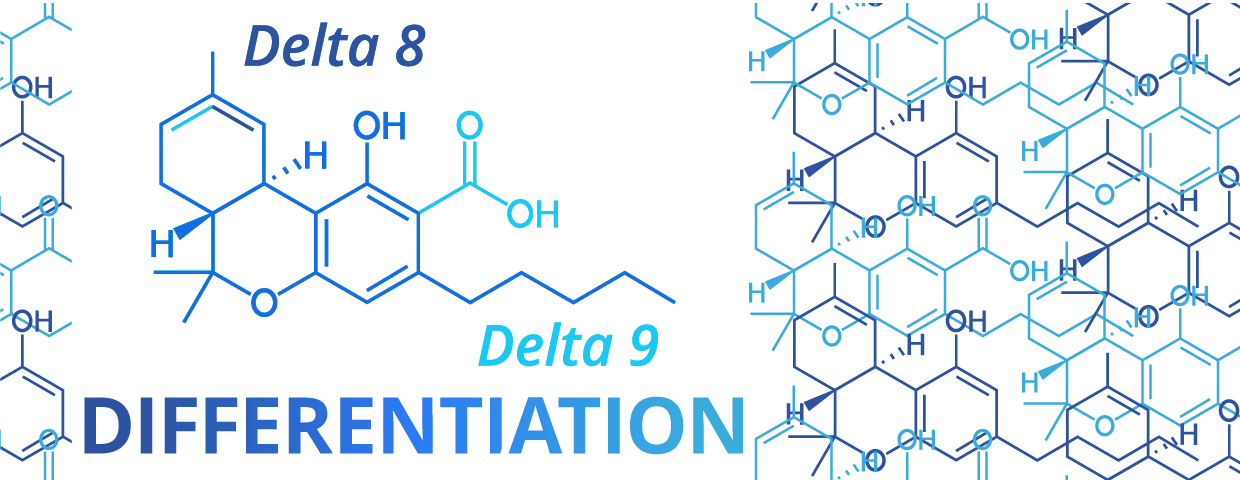Why Should My Lab Offer Delta-8/Delta-9 THC Differentiation?

- Delta-8 Tetrahydrocannabinoid (Delta-8 THC) is legal at the federal level; but it’s not legal in every state. Delta-9 Tetrahydrocannabinoid (Delta-9 THC) is illegal at the federal level; but it’s legal in more than 50% of states1.
- THC screening tests may produce a presumptive positive result for Delta-8 THC in addition to Delta-9 THC which creates the need for differentiation between the legal and illegal cannabinoids in a particular state.
United States federal law dictates that legal hemp-based cannabis products must contain less than 0.3% Delta-9 Tetrahydrocannabinol (the psychoactive ingredient in cannabis). Delta-8 THC is a positional isomer of Delta-9 THC which has psychoactive properties similar to those of Delta-9 THC. Hemp-based products containing higher levels of Delta-8 THC are being produced and consumed with increasing frequency by consumers. Traditional screening and confirmation tests do not distinguish Delta-8 THC from Delta-9 THC.
Delta-8 THC is not found in significant amounts in the cannabis plant. Manufacturers concentrate Delta-8 THC levels by manufacturing from hemp-derived cannabidiol (CBD), making it legal at the federal level. Even though Delta-8 THC is legal at the federal level, it doesn’t translate into a low- or no-risk experience for people who use these products.
Serious Risks Associated with Delta-8 THC2
- Products have not been evaluated by the FDA for safety. These products are easily purchased online and there is no control over product formulations or labeling. Products are also marketed to the public as therapeutic agents for a variety of maladies which violates federal law.
- The U.S. Food and Drug Administration (FDA) has received adverse event reports in people who consumed Delta-8 THC products.
- Delta-8 THC causes psychoactive, intoxicating effects similar to Delta-9 THC.
- Manufacturing techniques of Delta-8 THC involves the use of harmful chemicals that exposes the user to these contaminants,
- These products are presented as candy (gummies, chocolate, etc.) that appeal to children and are easily purchased at convenience stores and gas stations. Poison control centers receive calls about children who have ingested these products.
Who Does This Apply To?
Many people use products containing Delta-8 THC due to their easy accessibility and claims to treat a variety of maladies. However, using these products can cause a presumptive positive result on a THC drug test, even though the person hasn’t used Delta-9 THC. The National Drug Court Institute recommends avoiding products containing Delta-8 THC if a person is requested to appear for a drug test3.
How are Treatment Courts Affected?
Treatment court participants find Delta-8 THC products attractive because the legality of these products is questionable and because these products still produce a mild “high”4. However, when the participant’s urine sample tested positive for cannabinoids in the initial screening test, it may not confirm as positive by gas chromatography/mass spectrometry (GC/MS) or liquid chromatography with tandem mass spectrometry (LC/MS/MS)4. THC confirmation tests are usually designed to detect only specific compounds related to the use of cannabis. If the confirmation test does not specifically search for delta-8 metabolites (and it does not do so routinely), the GC/MS or LC/MS/MS testing will not detect the delta-8 metabolites, and the original positive cannabinoid test may be erroneously reported as negative for THC or unconfirmed4. This presents issues for the treatment court whose mission is to get the participant ‘clean’ from any drug use. Treatment courts may have to add Delta-8 THC products to their list of prohibited products used by participants that interfere with drug testing results.
What Your Lab Can Do
To resolve the conflicting screening and confirmatory test results and to determine the actual cause of a presumptive positive THC test, DTPM announces the availability of LC-MS/MS confirmatory testing that will differentiate metabolites of Delta-8 THC and Delta-9 THC and determine their concentration in urine samples. For Delta-8/Delta-9 THC Differentiation, simply order the Delta-8/9 Confirmation Panel via the Phoenix Laboratory Information Management software. If you do not have the Phoenix software, contact sales@DTPM.com for assistance.
- https://www.cdc.gov/marijuana/featured-topics/what-we-know-about-marijuana.html
- https://www.fda.gov/consumers/consumer-updates/5-things-know-about-delta-8-tetrahydrocannabinol-delta-8-thc
- https://www.healthline.com/health/does-delta-8-show-up-on-a-drug-test#short-answer
- https://allrise.org/wp-content/uploads/2023/05/Delta-8-Fact-Sheet.pdf







